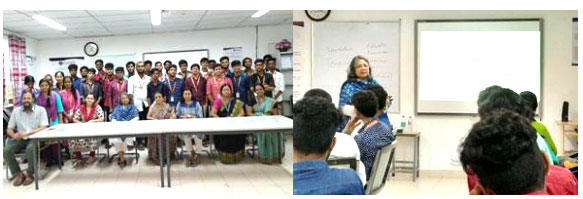Clean Water and Sanitation
B.S.Abdur Rahman Crescent Institute of Science and Technolgy measures the total volume of waster used in the Institution . Then main source of water supply for the Institute includes
(i) Water supply from private water supply: The water is transported to the Institute by means of lorry.
ii) Bore wells : The water required is also met by extracting the water from the bore well (3 Nos) and open well (3 Nos ) facility available in the Institute. The Institute also ensures that the quality of water obtained from the private supply and also from the well meets the drinking water standards by frequently conducting the water quality test.
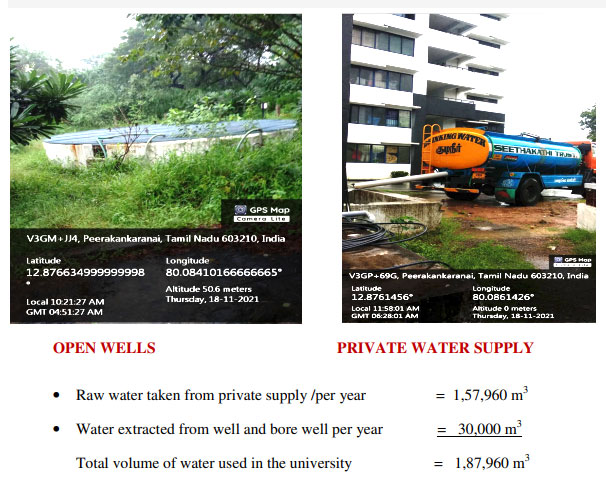
Water Treatment plants are provided – 5 Nos. at various places in the campus to treat the water before use in quarters, RO Plants, Men’s Hostel & Ladies hostel.
The capacity and quantity of water treated by each plant is tabled below
| S.NO | LOCATION | CAPACITY | WORKING HOURS | REMARKS |
|---|---|---|---|---|
| 1 | New staff Quarters | 5m3/hr | 10 | Commissioned in Apr -2016 |
| 2 | New ladies hostel | 5m3/hr | 12 | Commissioned in Aug -2016 |
| 3 | Men’s hostel service block | 10m3/hr | 18 | Commissioned in Aug -2016 |
| 4 | VC Villa | 1m3/hr | 4 | Commissioned in Jan -2017 |
| 5 | Life Science block | 5m3/hr | 8 | Commissioned in Aug -2017 |
| Total Treated Water | 3,35,000Liters per day | |||
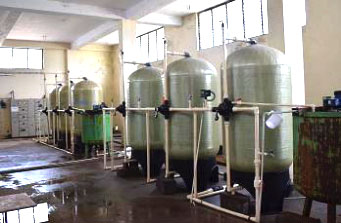
B.S. Abdur Rahman Crescent Institute of Science and Technology takes sufficient measures to treat the wastewater generated within the premises and it ensures that the treated water is reused within the campus. The Institute has established suitable and sustainable sewage treatment plants with the design features to completely treat the wastewater generated in the Institute. The details of the treatment plant and the process of wastewater management are given below
2 nos. of Sewage treatment plants of 250KLD capacity are installed in the campus
| Location | Capacity | Remarks |
|---|---|---|
| College campus | 250KLD | Commissioned in 2003 as a 150KLd plant. Revamped and capacity increased to 250KLD in 2015 |
| Men’s Hostel | 250KLD | Commissioned in 2014 |
- The sewage generated in the Institute is generally characterized by the presence of organic, inorganic and suspended solids.
- The chain of treatment is aimed to remove such pollutants from the wastewater so that it can be effectively reused
- The treatment system consists of preliminary treatment system followed by the primary and secondary treatment process
- Bar Screens are used in the treatment plant to remove materials like plastics and other floating objects
- The grit chambers are used to remove sand and silts from the wastewater
- The primary sedimentation tank helps in the removal of the suspended solids
- The biological treatment system is the secondary treatment process used in the removal of organics from the wastewater
- The suspended solids are removed using the primary sedimentation tank and after this the wastewater is subjected to biological treatment to remove the organic content from the waste.
- The secondary treatment process is incorporated with ECO-BIO BLOCK so as to increase the efficiency of the treatment system
- The Eco-Bio Bricks helps in the attachment of bacteria in the treatment system and helps in the better removal of organic content from the wastewater
- This attached system will also help the treatment system to handle shock loadings if there is an increase in the organic loading rate in the biological treatment system
- The sewage treatment plant is working on the principle of attached growth aerobic system (Eco-Bio Block) followed by sand filter and carbon filter
- The carbon and sand filter ensures that any amount of organics that is left in the wastewater is suitably adsorbed from the wastewater and it is stored in the collection tank
- The entire Sewage Treatment Plant is periodically subjected to maintenance regularly
- The working of all the pumps and valves are checked periodically to ensure the smooth functioning of the sewage treatment plant
- The treated water is used for landscaping and toilet flushing purpose
- This helps the university to reduce its dependency of fresh water from wells for gardening
- The physical, chemical and biological characteristics of the treated water are tested to ensure the efficiency of the treatment systems
- Some of the important parameters checked include pH, solids, Chemical oxygen demand, Biochemical oxygen demand, Nitrates, chlorides etc.
- The treated wastewater is checked periodically to ensure its quality so that it can be effectively reused for gardening and as well for the toilet flushing
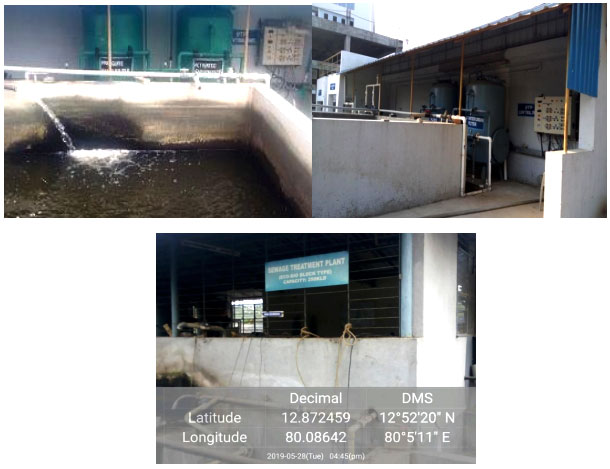
The Institute through its continous treatment and monitoring, could achieve 90% of water reutilization
| S.No | Location | Total waste water collected | Water recycled | % of water reutilized |
|---|---|---|---|---|
| 1 | College campus | 250 KL | 220KL | 90 |
| 2 | Men’s Hostel | 250 KL | 220KL | 90 |
The Institute has also established MIRA CARBON SEWAGE TREATMENT PLANT of 2m3 capacity and VERMI FILTRATION TREATMENT UNIT in association with M/S.Kanyo Group of Companies to treat the wastewater generated from the Institute.
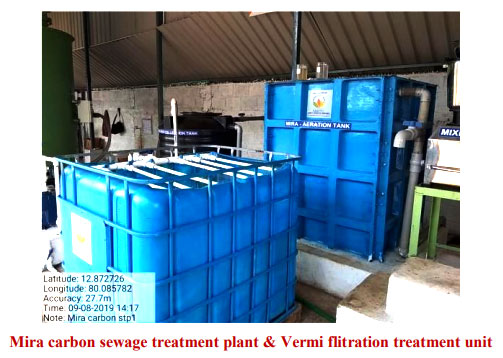
BSA Crescent Institute of Science and Technology has Reverse Osmosis (RO) Plant to provide drinking water to the college and hostel. The entire college campus is facilitated with pure Reverse Osmosis (RO) drinking water with water coolers in every block to cater to the need of pure and safe drinking water to all. The Institute has RO systems with a processing capacity of 44,500 liters / day installed in the campus and water dispensers are available in each floor in every building. The water treatment plants provide safe drinking water at every tap on the campus. A high level of maintenance frequent inspection and regular testing ensure the quality of the water. Water treatment plant with reverse osmosis technology is available to provide quality drinking water.
| S.No | Location | Capacity Liters/Hr | Working Hours Per day | Qty. of Treated Water in liters |
|---|---|---|---|---|
| 1 | University Main Plant-Near to Main block | 1500 | 6 | 9000 |
| 3 | Ladies Hostel New block Terrace | 500 | 5 | 2500 |
| 4 | Men’s Hostel Dining Hall | 2000 | 4 | 8000 |
| 5 | Men’s Hostel Service block | 2000 | 5 | 10000 |
| 6 | Aeronautical Block terrace | 500 | 2 | 1000 |
| 7 | Life Sciences block terrace | 500 | 2 | 1000 |
| 8 | New architecture terrace | 2000 | 4 | 8000 |
| Total treated Water | 10000 | 44500 | ||
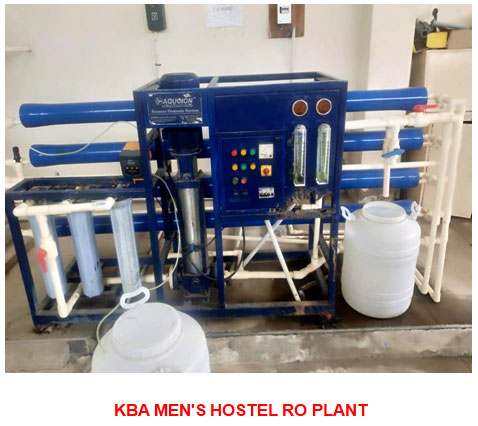
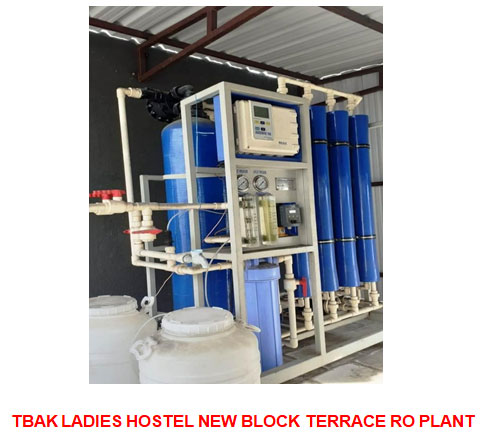
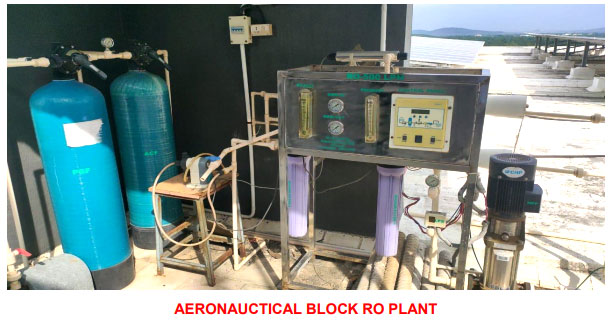
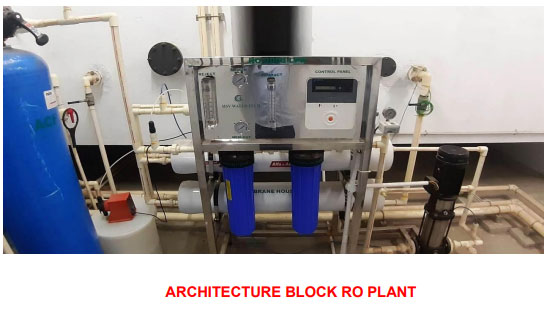
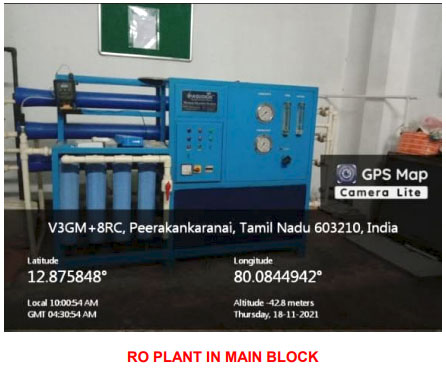
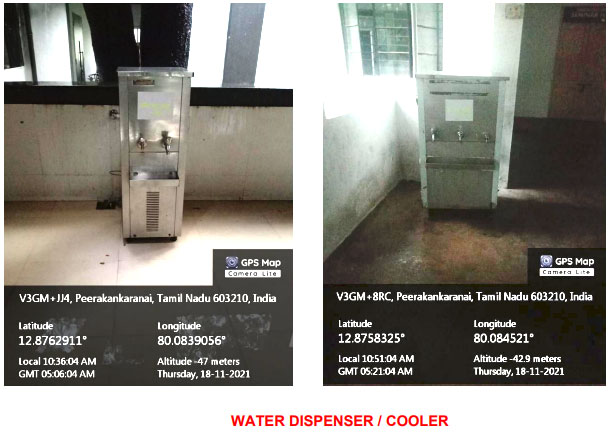
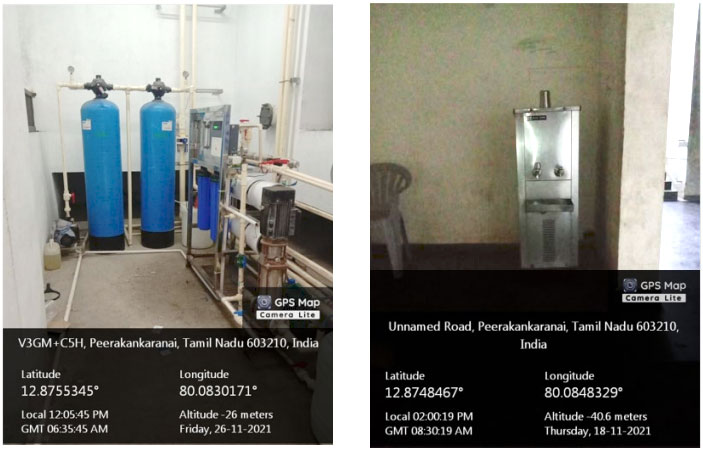
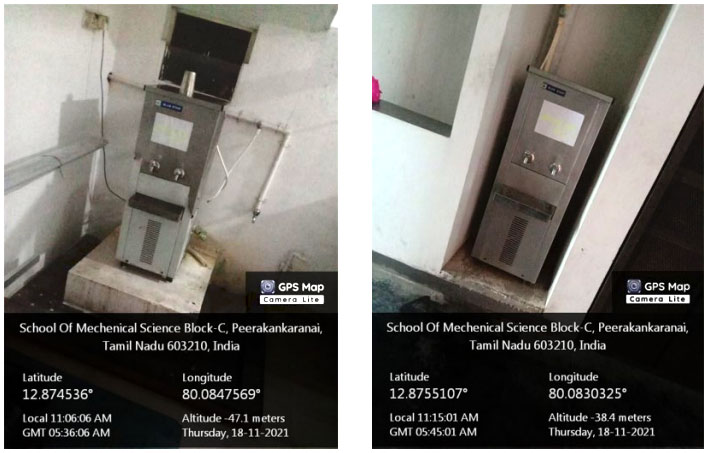
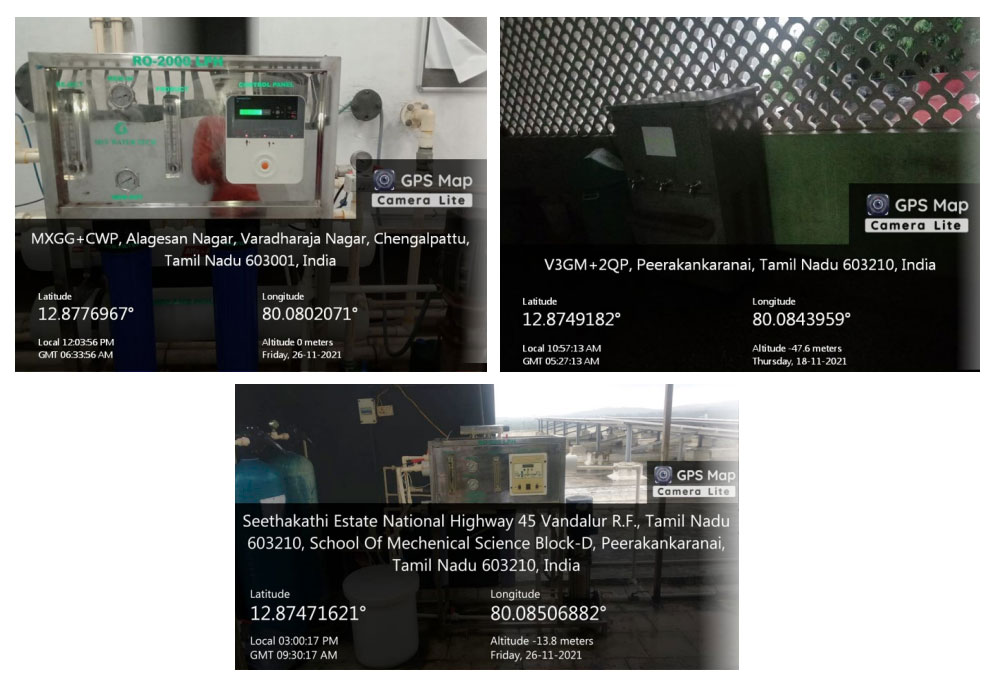
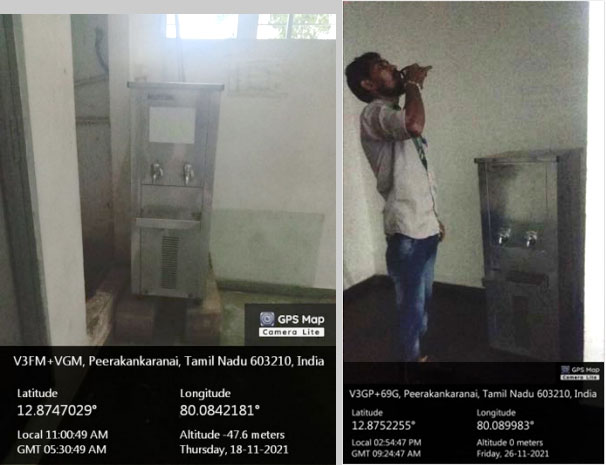
B.S.Abdur Rahman Crescent Institute of Science and Technology provides free drinking water for staff, students and visitors. It also ensures that the drinking water is of good quality and meet the standards. For this purpose the Institute has established water treatment plant in the campus. The details are given below.
There are 5 Water Treatment plants installed at various places in the campus to treat the water before use in toilets, quarters, Men’s Hostel & Ladies hostel.
The capacity and quantity of water treated by each plant is tabled below.
| S.NO | LOCATION | CAPACITY | WORKING HOURS | REMARKS |
|---|---|---|---|---|
| 1 | New staff Quarters | 5m3/hr | 10 | Commissioned in Apr -2016 |
| 2 | New ladies hostel | 5m3/hr | 12 | Commissioned in Aug -2016 |
| 3 | Men’s hostel service block | 10m3/hr | 18 | Commissioned in Aug -2016 |
| 4 | VC Villa | 1m3/hr | 4 | Commissioned in Jan -2017 |
| 5 | Life Science block | 5m3/hr | 8 | Commissioned in Aug -2017 |
| Total Treated Water | 3,35,000Liters per day | |||
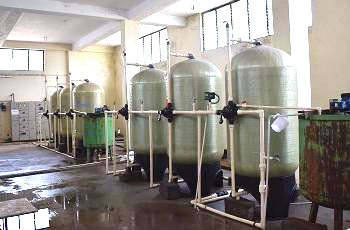
WATER TREATMENT PLANT
The water consumption details are given below
| Sl. No | Water Consumption / Day | Occupancy in Nos | consumption/day in liters |
|---|---|---|---|
| Occupants | |||
| 1 | College Student day scholars 45 lit/day @ 70% usage | 3700 | 116550 |
| 2 | Ladies Hostel 125 lit/day | 470 | 58750 |
| 3 | Men’s Hostel 125 lit/day | 1400 | 175000 |
| 4 | Miscellaneous (1)College/ staff 45 lit/day | 400 | 18000 |
| (2)Estate office staff 30lit/day | 350 | 10500 | |
| (3) General workers | 280 | 8400 | |
| (4) Kitchen and canteen | 50 | 10000 | |
| 5 | Quarters 125lit/day | 400 | 50000 |
| 7050 | 447200 | ||
| 6 | Floating @ 5% | 7403 | 10575 |
| Total water consumption/day in liters | 4,57,775 | ||
| Avg water consumption per capita/day | 62 |
The Institute has adopted different measures to promote the conscious water usage on campus and in the wider community.
The Institute has installed various Notice boards such as “ Save water” and various other messages promoting the conscious water usage. These boards are placed across canteen, Mens hostel and in several other locations in the campus. This will create awareness and reduce the water consumption while washing hands etc among students and various other stakeholders
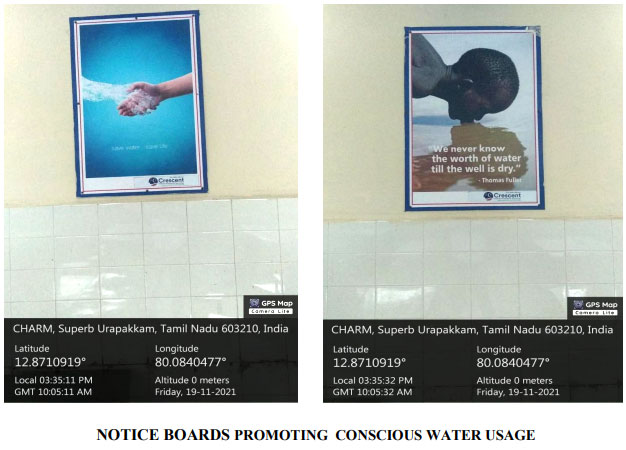
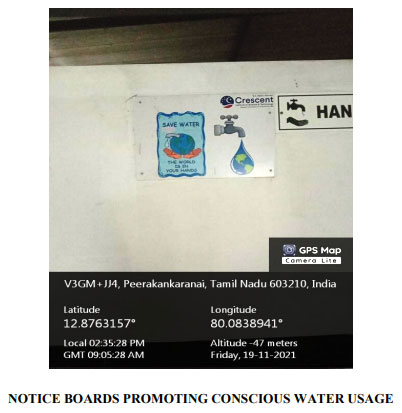
The Institute has given due consideration in promoting initiatives for saving energy and reducing water usage in buildings by emplyoying sensors. In order to minimize water usage and also to avoid the unnessary wasteage of water, automatic waterlevel controller and automatic flush controller with sensors are being installed in the campus
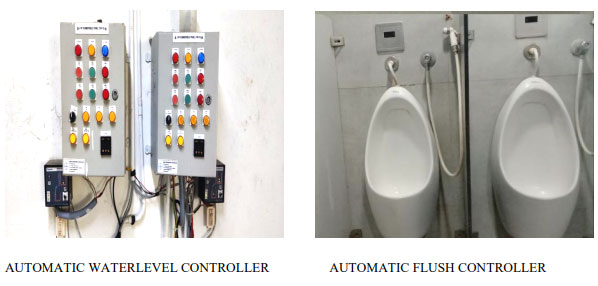
Our Institution is trying to implement smart water management system in the campus. Towards this, a proposal has been received from WEGoT Utility Solutions- Smart Water Management. This project puts forward an IoT-based solution for collecting water level from the tanks using sensors, transmitting it to a centralized server, visualizing the data through a web interface. The automated system helps the maintenance team to monitor the amount of water consumed in various buildings using the consumption details provided by the system.
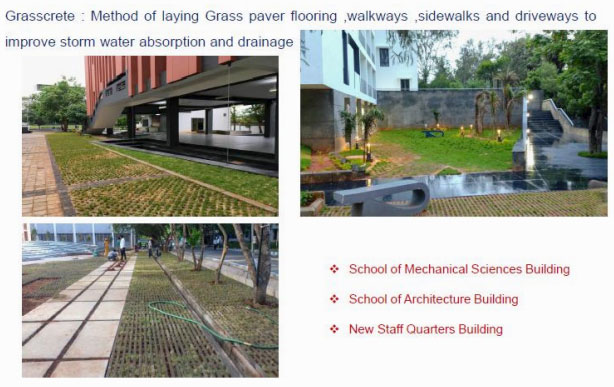
B.S. Adbur Rahman Crescent Institute of Science and Technology have implemented sufficient measures to prevent the pollution caused by accidents and incidents at the university. Apart from
the water pipelines another important water system that can be polluted is the rain water harvesting
- B.S Abdur Rahman Crescent Institute of science and technology is one of the pioneers in implementing solutions to save water.
- Rainwater harvesting facility is done in all blocks to collect rainwater from the roof of all buildings
- The harvested water is diverted to open wells in institute campus, Men’s Hostel and ladies hostel
- The placement of rainwater facility within the campus is decided upon by considering the profile of the land so as to drain the maximum amount of water collected with ease.
- In the buildings, sufficient plumbing connections are provided to trap the rain water from the roof tops
- Underground connections are ensured to connect the collected water from the roof top to the rainwater recharge pit.
- It was also ensured that the rainwater harvesting structures are constructed as per the norms. The recharge pit provided to collect the rain water is series of filter bed.
- The recharge pits are properly dsigned to prevent the entry of any solid waste
- A mesh is provided at the inlets of rain water pipes so that solid waste/debris is prevented
- Access Manhole frames and covers are provided.
- The rain water is also stored in Underground sumps of Life Science block, Mechanical Science Block and New Staff Quarters.
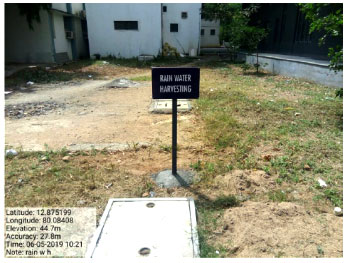
Exclusive filter system is also placed so as to flushout the dust particles and other smaller solid particles entering the rain water system
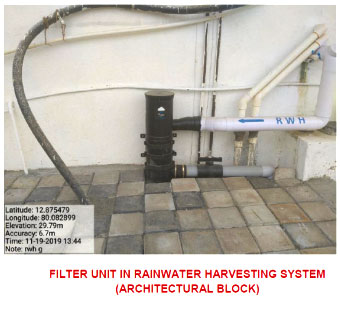
B.S.Adbur Rahman Crescent Institute of Science and Technology have implemented sufficient measures to prevent the water pollution caused by accidents and incidents at the university. The water system can also be contaminated due to the improper disposal of the solid waste. Especially the waste like plastics can clog the pipelines and affect the quality as well as the flow of the water.Institue has ensured that a proper solid waste management is in parctised and hence preventing the water pollution. Some of the processes practised in the Institute are given below
In order to avoid water pollution and enhance the solid waste management, the following preventive measures have been applied in the campus.
- Segregation of Garbage to be controlled and monitored at entry point i.e from major areas like Hostel and canteen
- Mimimisation of the waste throwing (plastic,papers& bottles ) to the dumbing yard
- Height of garbe stocked is almost to the height compound wall to be restricted
- Clearing the entire gargabe from dumping yard very frequently
- Sewer connection to old bio gas plant should be diverted to STP by direct connections – Mixing of sewer and rainwater may be restricted
- Closing all the holes contributing to the seepage of water from zoo and other neighbourhood all along the boundary of the Institute
- Frequent disposal of existing stoked waste (plastic,papers& bottles)
- Utilisation of the additional raw water storage tank during emergency time.
THE SEQUENCE OF SOLID WASTE MANAGEMENT PROCESS IN THE CAMPUS IS GIVEN BELOW
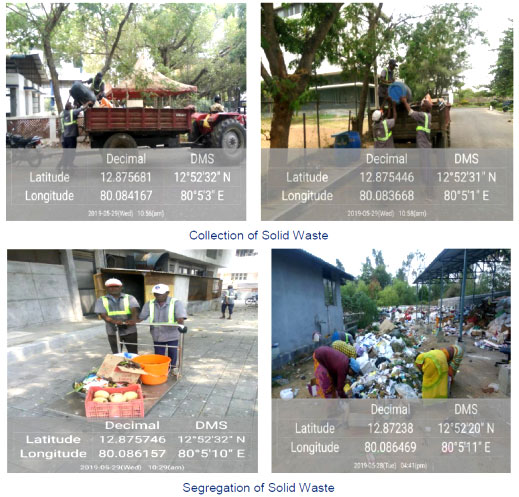
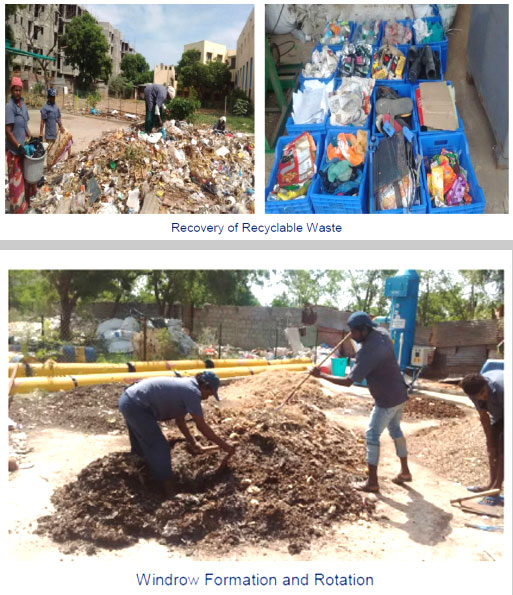
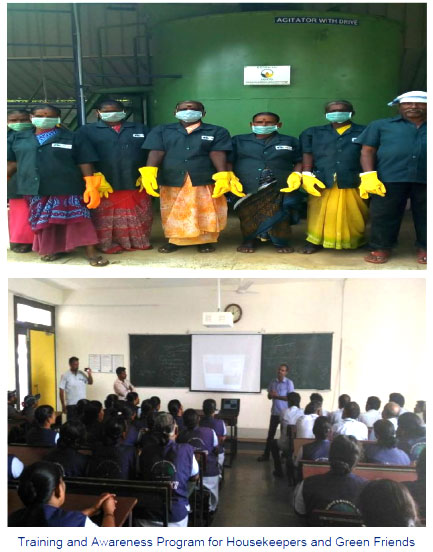
B.S.Abdur Rahman Crescent Institute of Science and Technolgy has always taken intaitves to develop a good landscape in the campus. The Institue has more than 30 varieties of trees planted across the campus. The Institute has also focused on to plant trees to minimise water usage.
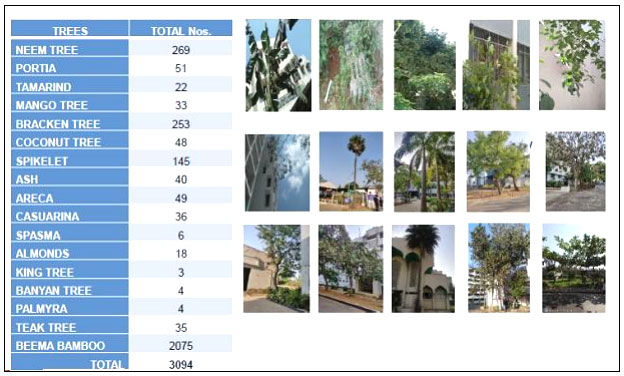
Bamboo plants are effective for conserving water due to their culms ability in keeping water for a long period and maintain underground water flow. It also gives contribution to natural system such as oil erosion control, water conservation, land rehabilitation, and carbon sequestration. The Institute has planted bamboo saplings for 5000 sft run area throughout our compound to absorb dust, reduce CO2 , to release more oxygen and to create pollution free environment. In future, the upcoming Central bus stand in vandalur is expected to produce lot of pollution inside
the campus. Hence by planting bamboo, the campus will be dust free zone with good oxygen supply.The Institute has provided first OXYZONE inside the campus. Beema Bamboo Plants 2000 Nos are planted in whole campus for CO2 reduction
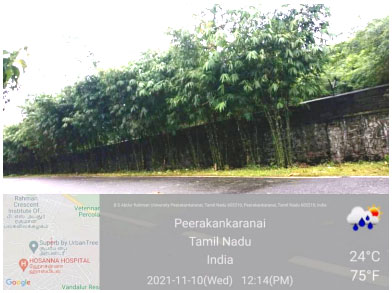
The Institue is the proud owner of “Tissue culture bamboo plant” of variety “ BEEMA”. This is one of the super bamboo, Every plant generates over 300 kh of oxygen every year which is sufficient for one person for a year. These plants are also contribute to water conservation . Oxy Park is created in the campus opposite to Convention Centre.
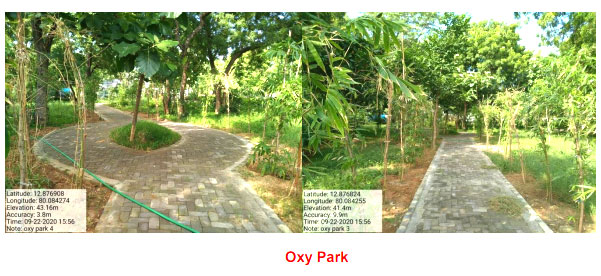
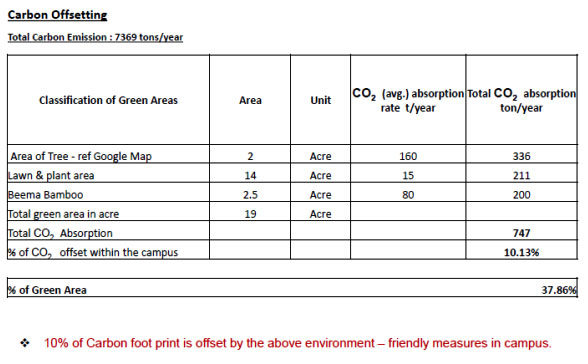
B.S.Abdur Rahman Crescent Institute of Science and Tecnology provide educational ooportuniteis for local communities to learn about the good water management.The Instititue adopts various methodologies to educate the local community.The Institute conducts awareness programs in the local community by coordinating along with the faculty members and students.
Jal Shakthi Abhiyan
Ministry of Human resources Development is observing “Swachhta Pakhwada 2019” during the 1st September to 15th September. The main aim of this mission was to conduct water conservation campaign “ Jal Shakthi Abhiyan “A team comprises of 9 faculties and 34 students from the Department of Civil Engineering visited the “Karanai Puducheri” a village located at a distance of 5.7 km from our Institute on 05.09.2019 for making a campaign about Rain water harvesting and good water management practices . The team met the Village Administrative officer and Chairman
of the village and discussed the present status of the village with respect to (i) sources of drinking water, (ii) condition of the existing water bodies, (iii) disposal of sewage and (iv) methods of disposing the solid waste generated in the village. They also created awreness about the need for water management and importance of rain water harvesting.
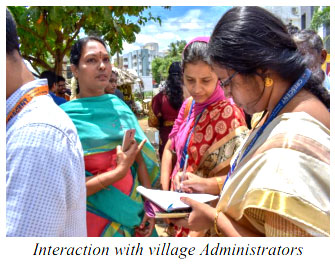
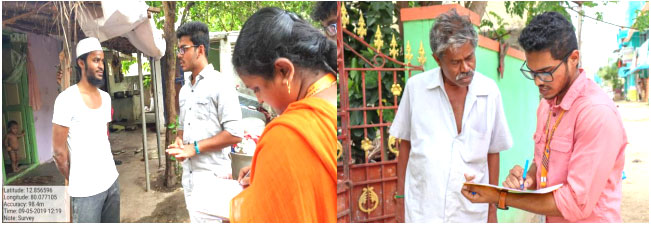
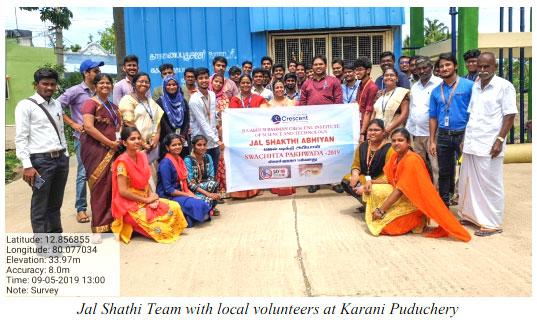
UNNAT BHARAT ABHIYAN (UBA)
B.S. Abdhur Rahman Crescent Institute of Science and Technology Undertakes several programmes proposed by the Government of India, Ministry of Human Resource Development, Department of Higher Education. Unnat Bharat Abhiyan (UBA), is government proposal to link the Higher Educational Institutions with a set of (5) villages, so that the institutions can contribute to the economic and social betterment of the village communities using their knowledge base. Students and faculty from the Institute conducted a surevy on April 23, 2019 at Manimangalam village Kanchipuram district as per Unnat Bharat Abhiyan scheme and also created awareness on water management among the local community
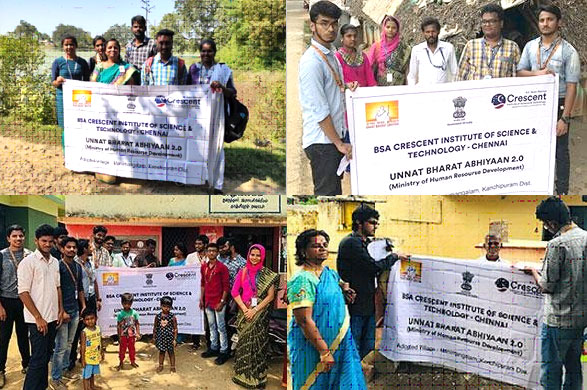
B.S.Abdur Rahman Crescent Institute of Science and Tecnology provide educational ooportuniteis for local communities to learn about the good water management.The Instititue adopts various methodologies to educate the local community. The webinars, workshops etc are arranged for the various group of people in the community who are interested in water management and are looking for the opportunities for the water conservation. During the webinars, experts in the field will be invited to deliver the lecture on water management and water conservation practices. “Young Genius”- national level competition for school students was organized by the Department of Civil Engineering on 16.10.2019. It was an initiative taken under Jal Shakthi Abhiyan scheme and the theme of the event was ” Leaving no one behind- Safe water for all”. The main aim of this competition was to give opportunities for the young minds to propose innovative ideas to protect the water from pollution. Oratorical and poster presentation competitions on the theme of “safe water for all” were conducted for students. The competition served as a platform for the students to exhibit new methodologies to establish safe methods to balance the natural resources especially water with human needs. Dr.R.Saravanan, Associate Professor, Centre for water resources, Anna University presided as chief guest and emphasized on the importance of water management. Nearly 110 school students from various schools across chennai participated in the event.
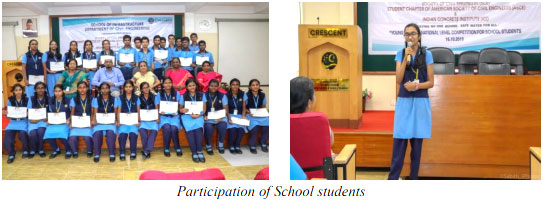
Department of Civil Engineering, School of Infrastructure conducted an online webinar series on “Sustainable waste management and legal aspects of EIA”. The webinar series also served as a forum where the importantance of water and wastewater management aspects were emphasised. Faculty members, Students, Research scholars from various colleges and Universities, Members from NGOs across India participated in the Webinar. Professionals from various industries also participated in the webinar

VARUNA INTERNATIONAL SERVICE ON 23rd MARCH 2020 to 24th MAY 2020
Collaborating with various districts in India, also 3232, this was an online project creating awareness on social media for water conservation. The problem of water scarcity was welldefined and a solution was arrived upon. The need for conscious water usage as emphasized among the participants. Several students and other beneficiaries form the society actively participated in the event.
- Online project
- No. of Beneficiaries : 150
- In a 2-day webinar, top Rotary leaders addressed the participants
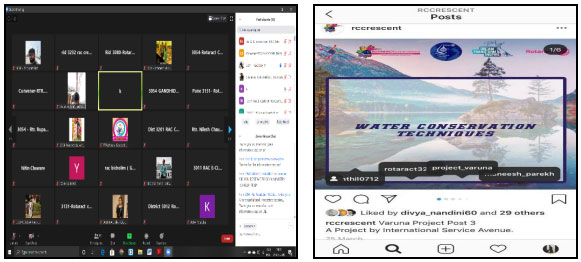
NSS Special Camp – Keerappakam, Arungal and Murugamangalam panchayaths – Kanchipuram district
The seven days special camp has been organized by the NSS units of BS Abdur Rahman Crescent Institute of Science and Technology at Keerappakam, Arungal, and Murugamangalam panchayaths in the Kattankullathur union of Kanchipuram district of Tamil Nadu during the period of July 25-31, 2019. There were various programmes and functions were organized under the leadership of the NSS units of the Crescent Institute. Programmes like cleaning of school premises, awareness of healthy food habits, importance of hygiene and sanitation, manuring and irrigation, importance of disaster management, farm pond, rainwater harvesting and conservation methods- and various sports, funs and cultural programmes for the school children’s and for NSS volunteers. The main motives for conducting the special camp is to develop the society, enlighten the villagers by giving awareness. Around 150 volunteers from the three III units of the NSS Crescent Institute of Science and Technology including boys and girls were actively participated each and every programme conducted in the village as part of special camp.

Value added Training programme (Sanitation Solutions in Urban India)
Department of Civil Engineering, School of Infrastructure in association with Indian Institute for Human settlements organised Two day Value added training programme in “Non-sewered Sanitation an important link for Sanitation Solutions in Urban India” on 27.09.2019 & 28.09.2019 for Students. A training was given to students to regarding the techniques for reduction in water usage and also maintain sanitation in urban places.
